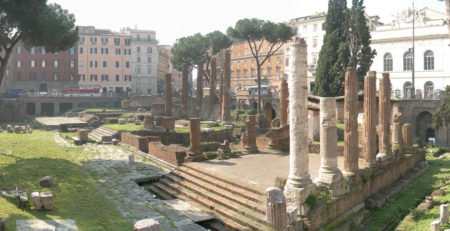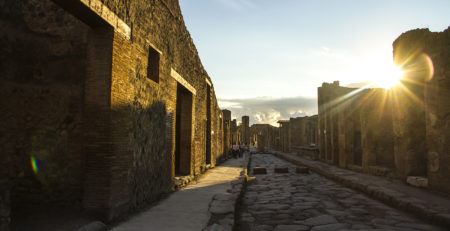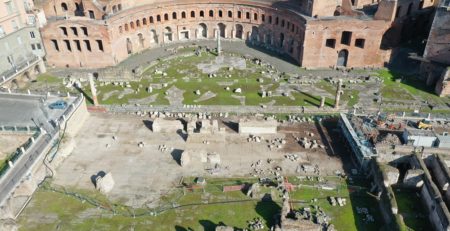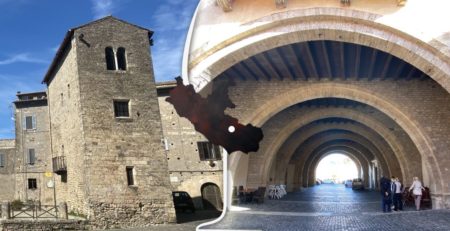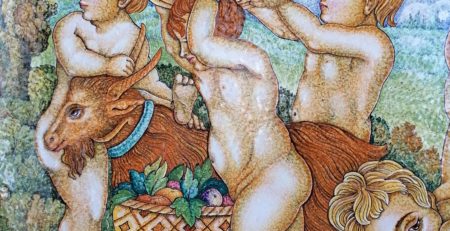Roman and Greek Gods: Who’s who
The Romans and Greek Gods
Below is Italy’s Best’s list of the who’s who of the Roman deities and what divine departments they were managing. What with there being two different versions of each God, and all. The Greek and Roman versions.
Jupiter (Zeus in Greece)
God of the Sky
Distinguishing Features: Pinstriped suit, neatly trimmed grey beard, stormy eyes and a very large, dangerous lightning bolt.
Now: On stormy days, he can be found brooding in his throne room in Mount Olympus, over the Empire State Building in New York. Sometimes he travels the world in disguise, so be nice to everyone! You never know when the next person you meet might be packing the master bolt.
Then: In the old days, Zeus ruled over his unruly family of Olympians while they bickered and fought and got jealous of each other. Not much different than today, really. Zeus always had an eye for beautiful women, which often got him in trouble with his wife, Hera.
Symbol: Eagle
Juno (Hera in Greece)
Goddess of Marriage, Mothers and Families
Distinguishing Features: Usually prefers classic Greek dresses and a simple silver crown, though she can blend in as needed. She usually appears as a beautiful older woman, and enjoys turning into birds when she needs to hide or spy.
Now: She hangs out where family life is strongest: weekend soccer matches, and birthday parties. As the goddess of family, Hera will be happy to pack your lunch or comb your hair or give you a ride to school, but don’t talk back to her. When Hera is mad, she doesn’t just ground you. She’s likely to smash you into the ground.
Then: It’s tough to be the goddess of marriage in a family where everyone cheats on everybody. Hera has no patience with demigods, the children of godly affairs. She was the enemy of Heracles and many others, though she did have a soft spot for mortal heroes, like Jason.
Symbol: pomegranate
Neptune (Poseidon)
Poseidon
God of the Sea
Distinguishing Features: Hawaiian shirt, shorts, flip flops, and a three-pointed trident.
Now: Poseidon walks the beaches of Florida, occasionally stopping to chat with fishermen or take pictures for tourists. If he’s in a bad mood, he stirs up a hurricane.
Then: Poseidon was always a moody guy. On his good days, he did cool stuff like create horses out of sea foam. On his bad days, he caused minor problems like destroying cities with earthquakes or sinking entire fleets of ships. But hey, a god has the right to throw a temper tantrum, doesn’t he?
Symbol: Three-pointed trident
Ceres (Demeter)
Goddess of Agriculture
Distinguishing Features: The goddess prefers simple dresses of green or gold, though you can often find her in gardening clothes.
Now: Demeter divides her time between the upper world, where she oversees the growing season and produces commercials encouraging people to eat more cereal products (part of a balanced breakfast!), and the Underworld, where she visits her daughter Persephone and plays the wicked mother-in-law to Hades, who kidnapped her poor little daughter yonks ago. He’s still not good enough for Persephone. She should’ve married the god of doctors!
Then: Demeter was one of the quieter goddess. As long as the crops were growing and the farmers were happy, Demeter was content. But don’t underestimate her importance. If you wanted to eat, you had to make sure you kept on Demeter’s good side. When Hades stole her daughter Persephone, Demeter stopped all plants from growing, and people started starving. Hard to make a cheeseburger with no grain for bread and no grass for the cows.
Symbol: Torch, Corn plant (though popcorn works, too)
God of War (Mars Ares)
Distinguishing Features: Biker leathers, Harley Davidson, sunglasses and a stinking attitude.
Now: Can be found riding his Harley around the suburbs of LA. One of those gods who could pick a fight in an empty room.
Then: Back in the day, this son of Zeus and Hera used to be inseparable from his shield and helmet. Fought on the side of the Trojans during the war of Troy, but, frankly, has been involved in every minor skirmish since Goldilocks told the three bears that their beds were a little uncomfy.
Symbol: A bloody spear, a wild boar
Minerva (Athena)
Goddess of Wisdom, War, and Useful Arts
Distinguishing Features: Dark hair, striking grey eyes, casual yet fashionable clothes (except when she’s going into battle; then it’s full body armour). Athena is always accompanied by at least one owl, her sacred (and fortunately housebroken) animal.
Now: You’re likely to spot Athena at an American university, sitting in on lectures about military history or technology. She favours people who invent useful things, and will sometimes appear to reward them with magical gifts or bits of useful advice (like next week’s lottery numbers). So start working on that revolutionary new bread slicer!
Then: Athena was one of the most active goddesses in human affairs. She helped out Odysseus, sponsored the entire city of Athens and made sure the Greeks won the Trojan War. On the downside, she’s proud and has a big temper. Just ask Arachne, who got turned into a spider for daring to compare her weaving skills to Athena’s.
Symbol: The owl
Apollo (Apollo in Greek too)
God of archery, music, poetry, prophecy, medicine, and later on the god of the sun.
Distinguishing Features: You’ve got to dig the shades. Apollo likes to look hot, and I don’t mean temperature. He typically looks like a movie star with the fashionably shabby clothes, the laid back attitude, the brilliant smile, and the Ray Ban sunglasses. His sun chariot morphs into a fine Maserati.
Now: Do NOT ask him to recite his poetry. Seriously. You can find Apollo cruising down Sunset Avenue looking cool, or hanging out at parties chatting with writers or rock stars. He likes to be the centre of attention wherever he goes. He’s a nice enough guy, as long as you agree that he’s the coolest person on earth. Just don’t get him angry, or he can get a little hot under the collar.
Then: Apollo was into everything, from music to medicine, probably because he thought he was better at everything than anyone else. When the old sun god Helios retired, Apollo took over that job too, though he was mostly thought of as the god of poetry and music. Apollo didn’t take criticism well. One time he asked King Midas to judge a contest between him and Pan, and when Midas decided Pan’s music was better, Apollo gave the king donkey ears. The lesson: if someone asks your opinion, think carefully before you answer.
Symbol: the lyre, laurel wreath
Roman name: Apollo (you can’t improve on perfection, baby!)
Diana (Artemis)
Goddess of the moon, the hunt, and young maidens
Distinguishing features: Artemis likes to appear as a regular mortal maiden of about twelve or thirteen, but don’t let that fool you. Artemis is deadly with her bow, and doesn’t suffer fools, especially male fools. Her eyes are silver like the moon, and she tends to dress in white and silver.
Now: Artemis can be found roaming the countryside with her handmaidens, the Hunters of Artemis. Imagine an immortal, very deadly Girl Scout troop, on a permanent camp out, hunting monsters. Don’t get in their way, and don’t try to flirt with them. These Girl Scouts do NOT sell cookies.
Then: Artemis enjoyed hunting with her handmaidens and basically kept to herself unless she was bothered. Once a male hunter tried to spy on Artemis while she was bathing. The goddess turned him into a deer and her hunters tracked him down and killed him. Basically, she doesn’t have much of a sense of humour when it comes to peeping toms.
Symbol: The moon, the deer
Venus (Aphrodite)
Goddess of Love and Beauty (oh, and theatre)
Distinguishing Features: She’s really, really pretty. It’s hard to be more specific, because Aphrodite can change her appearance to become whatever you find most beautiful.
Now: She’s more beautiful than Angelina Jolie. She can often be found shopping on Fifth Avenue or trying on new clothes during Fashion Week in New York. She loves parties, and can’t get enough of gossip. If that sounds like a lot of people you know, you’re probably right. Any of them might be Aphrodite in disguise.
Then: She’s more beautiful than Helen of Troy. Aphrodite wasn’t afraid to use her beauty to get what she wanted, either. She promised Prince Paris the most beautiful mortal woman in the world if he judged Aphrodite the fairest goddess in a contest, and Paris readily agreed. When he got Helen for his wife, it started the Trojan War and thousands died, but hey, at least Aphrodite got what she wanted!
Symbol: the dove, which is odd, since it’s a symbol of peace and Aphrodite started a war, but oh well. Looks are everything.
Mercury (Hermes)
God of the Roadways, Travellers, Merchants and Thieves
Distinguishing Features: Jogger’s clothes and winged athletic shoes, a cell phone that turns into the caduceus, his symbol of power – a winged staff with two snakes, George and Martha, entwined around it.
Now: Hermes is a hard person to find, because he’s always on the run. When he’s not delivering messages for the gods, he’s running a telecommunications company, an express delivery service, and every other type of business you can imagine that involves travel. Did you have a question about his activities as god of thieves? Leave a message. He’ll get back to you in a few millennia.
Then: Hermes got started young as a troublemaker. When he was one day old, he sneaked out of his crib and stole some cattle from his brother Apollo. Apollo probably would’ve blasted the young tyke to bits, but fortunately Hermes appeased him with a new musical instrument he created called the lyre. Apollo liked it so much he forgot all about the cows. The lyre made Apollo very popular with the ladies, which was more than he could say about the cattle.
Symbol: the caduceus
Vesta
The virgin goddess of the hearth, home, and family in Roman religion. Vesta’s presence is symbolized by the sacred fire that burned at her hearth and temples. Her closest Greek equivalent is Hestia.













